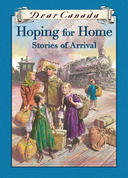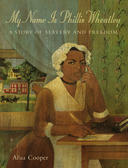
Children's Fiction Native American
My Name Is Henry Bibb
A Story of Slavery and Freedom
- Publisher
- Kids Can Press
- Initial publish date
- Sep 2009
- Category
- Native American, United States, 19th Century
-
Hardback
- ISBN
- 9781553378136
- Publish Date
- Sep 2009
- List Price
- $16.95
-
Paperback / softback
- ISBN
- 9781525310850
- Publish Date
- May 2023
- List Price
- $12.99
Add it to your shelf
Where to buy it
Out of print
This edition is not currently available in bookstores. Check your local library or search for used copies at Abebooks.
Recommended Age, Grade, and Reading Levels
- Age: 10 to 14
- Grade: 5 to 9
- Reading age: 10 to 14
Description
Often shocking, always compelling, Afua Cooper's novel is based on the life of Henry Bibb, an American slave who after repeated attempts escaped in 1841 to become an anti-slavery speaker, author and founder of a Black newspaper. Cooper takes painstakingly researched details about slavery and weaves an intimate story of Bibb's young life, which is overshadowed by inconceivable brutality.
At nine years old, Henry is separated from his mother and brothers and hired out, suffering abuse at the hands of cruel masters so severe he almost dies. Henry's courageous life is described in intimate detail and young readers will learn about everyday slave life on a plantation and in towns and cities, the coded language of slave escapes and the dangerous routes over land and water to safe houses.
As Henry Bibb moves from boyhood to manhood, he knows that one day he will “fly away” as in the old legend of the Africans who flew away to freedom. The first-person narrative, convincingly told in Henry's voice, traces Bibb's boyhood, marriage, fatherhood and the developing awareness of his bondage and his determination to break free of it or die.
About the author
Dr. Afua Cooper is an award-winning historian, author, and poet. She is professor of Black studies in the Faculty of Arts and Social Sciences, Dalhousie University where she holds a Killam Research Chair. Afua has mobilized Black studies in Canada through her scholarly work, and artistic endeavours—this within the academy and beyond. She established the Black Studies program at Dalhousie, first as a minor, and later as part of the leadership team that launched the Bachelor of Arts in Black and African Diaspora Studies. This is the first such program in Canada. Dr. Cooper also founded the Black Canadian Studies Association. She was awarded the Royal Society of Canada’s J.B. Tyrrell Historical medal for her outstanding contribution to Canadian history. Afua is the Principal Investigator for A Black People’s History of Canada project.
Awards
- Short-listed, Red Maple Award, Ontario Library Association
- Winner, Best Books for Kids & Teens, Canadian Children's Book Centre
- Winner, Applied Arts Photography & Illustration Award, Applied Arts
- Winner, Notable Social Studies Trade Books for Young People, NCSS-CBC
Editorial Reviews
There are many slave narratives about exciting escapes, but few tell of a young person's suffering with the close-up personal detail of this fictionalized biography.
Booklist
Librarian Reviews
My Name is Henry Bibb: A Story of Slavery and Freedom
Henry Bibb was born in Kentucky in 1814. He was born to an enslaved mulatto woman and a free White man but, according to the law at the time, a child born to a slave was automatically considered a slave. During his early years Henry lived on the same farm as his mother but, by the age of ten, he found himself being hired out to various slaveholders, most of whom doled out atrocious abuse. Henry became a runaway at a young age, but was always caught and returned to his owner. When Henry became a young man he met and married another slave and fathered a child. Not wanting his daughter to live the life of a slave, Henry decided to escape across the Ohio River and head north.It is at this point that Afua Cooper ends her fictionalized story of Henry Bibb’s early life, but she reveals important historical details of Henry’s later life in the epilogue. Henry Bibb finally escaped to Detroit in 1841, and eventually to Canada in 1850. He founded The Voice of the Fugitive, Canada’s first Black newspaper, was reunited with his mother and three brothers, but sadly never saw his wife and child again.
Afua Cooper writes a moving tale detailing the early life of Henry Bibb. Reading about his early struggles and the horrors of slavery, one can plainly see how this man came to be such a strong proponent of the antislavery movement. Writing the story from Henry’s point of view as a child will hopefully help young people relate more easily to the era of slavery and all its atrocities.
Written for students in the intermediate/early senior grades, this book would be an excellent resource when discussing Black History or for history buffs in general.
Source: The Canadian Children's Bookcentre. Fall 2009. Vol.32 No.4.
My Name Is Henry Bibb: A Story of Slavery and Freedom
Henry Bibb (1815-1854) was an author and abolitionist who started out life as a slave. His autobiography, published in 1849, made him famous in North America and Europe. This story, written in Bibb’s voice, tells of his journey to freedom. The text, based on historical facts and his writings, includes a prologue and an epilogue.Source: The Canadian Children’s Book Centre. Best Books for Kids & Teens. 2010.
Other titles by

In the Light of Dawn
The History and Legacy of a Black Canadian Community

L' explosion d'Halifax
6 décembre 1917, à 9 h 05 le matin

The Halifax Explosion
6 December 1917 at 9:05 in the Morning

The Underground Railroad
Next Stop, Toronto!

Black Writers Matter
Revised Edition

Black Matters

Dear Canada: Hoping for Home
Stories of Arrival

Cher Journal : Terre d'accueil, terre d'espoir
Onze récits

The Hanging Of Angelique
The Untold Story of Canadian Slavery and the Burning of Old Montreal

My Name Is Phillis Wheatley
A Story of Slavery and Freedom